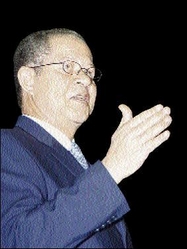Drastic spending cuts in July underscore fiscal dilemma
Published: Wednesday | August 12, 2009

Prime Minister Bruce Golding. - File
Prime Minister Bruce Golding's disclosure on Tuesday that the adminis-tration had, in the first four months of the fiscal year, spent $18 billion less than it projected suggests "savings" in July alone at nearly five times the level of the previous three months combined.
Or, looked at another way, the Government slashed its allocation for July by a third, signalling a new aggressiveness on the part of the administration to bring spending in closer alignment with revenue - an action which Golding warned business leaders would only be accelerated.
"Further drastic cuts will have to be made," Golding told members of the Private Sector Organisation of Jamaica (PSOJ) at a breakfast meeting in New Kingston.
Preliminary figures
The figures he quoted are preliminary and unpublished, and contained no breakout of the data.
Jamaica - it's already weakened economy battered by the global recession - is faced with a deep fiscal crisis reflected, in part, by a serious shortfall in government revenues.
For instance, Prime Minister Golding reported that up to July, the first four months of the fiscal year, overall revenue was $10 billion less than what the administration hoped to collect.
This would mean that revenue, up that point, was $85.7 billion or 10.5 per cent below projection.
Up to the end of June, the Government collected $62.47 billion, a shortfall of 11 per cent or $7.74 billion.
This underperformance of revenue has placed under severe threat the administration's intention of maintaining a public-sector deficit of 5.5 per cent of GDP and forced the finance minister, Audley Shaw, into drastic action, in part, to meet the International Monetary Fund's requirement for a US$1.2-billion loan.
By the end of June, three months into the fiscal year, the Government had spent $98.3 billion or 3.5 per less than Shaw had programmed.
The big funding pullback over the fiscal quarter was primarily in government programmes, where spending, at $15.5 billion, was approximately $4.1 billion or 21 per cent below what was allocated
Most other areas on the recurrent Budget were underspent.
But on the capital side, expenditure at $8.8 billion was $1.1 billion or 13 per cent above the allocation.
In recent weeks, well before last week's downgrade of Jamaica by the rating agency Standard and Poor's, government suppliers have reported difficulty being paid.
Warrants were being held for much longer than normal, they complained.
Part of the answer, it appears, lay in the expenditure numbers to which Prime Minister Golding referred at breakfast.
Based on the expenditure Budget that Parliament approved in April, the government programmed spending by the end of July would have been $143.3.
But with an $18-billion reduction - assuming the preliminary numbers hold up at final assessment - actual expenditure would have been around $127.3 billion, a shortfall of over 12 per cent.
That means that with $98.3 billion having been spent between April and June, the Government's July expenditure was around $29 billion, or just two-thirds the $43.5 initially allocated for the month.
In his speech to the private-sector leaders, Golding placed his "own credibility and political future ... on the line" for restoring economic stability and setting the country on a path to growth.
"In our present circumstances, taking action is not an optional endeavour," he said.
business@gleanerjm.com





















